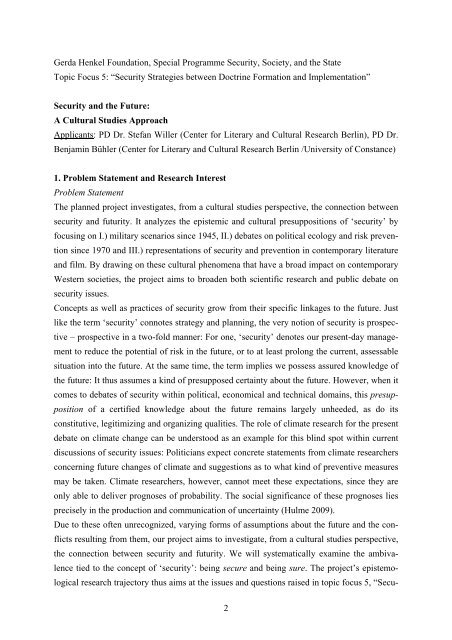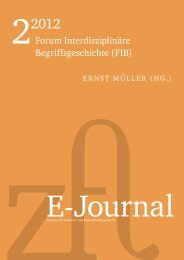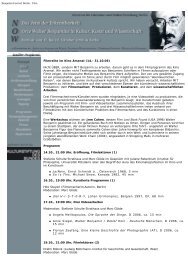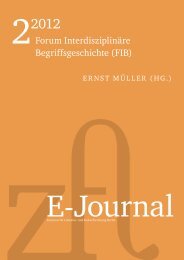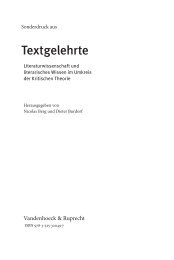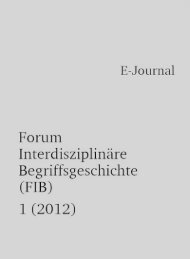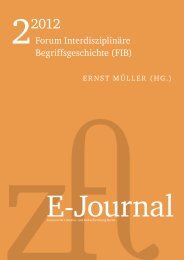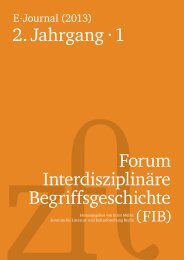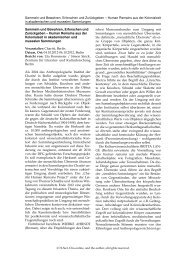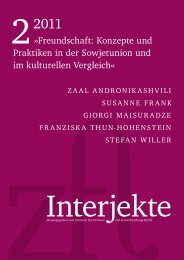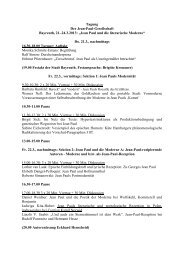Das Zentrum für Literatur- und Kulturforschung Berlin (ZfL) vergibt ...
Das Zentrum für Literatur- und Kulturforschung Berlin (ZfL) vergibt ...
Das Zentrum für Literatur- und Kulturforschung Berlin (ZfL) vergibt ...
Create successful ePaper yourself
Turn your PDF publications into a flip-book with our unique Google optimized e-Paper software.
Gerda Henkel Fo<strong>und</strong>ation, Special Programme Security, Society, and the State<br />
Topic Focus 5: “Security Strategies between Doctrine Formation and Implementation”<br />
Security and the Future:<br />
A Cultural Studies Approach<br />
Applicants: PD Dr. Stefan Willer (Center for Literary and Cultural Research <strong>Berlin</strong>), PD Dr.<br />
Benjamin Bühler (Center for Literary and Cultural Research <strong>Berlin</strong> /University of Constance)<br />
1. Problem Statement and Research Interest<br />
Problem Statement<br />
The planned project investigates, from a cultural studies perspective, the connection between<br />
security and futurity. It analyzes the epistemic and cultural presuppositions of ‘security’ by<br />
focusing on I.) military scenarios since 1945, II.) debates on political ecology and risk prevention<br />
since 1970 and III.) representations of security and prevention in contemporary literature<br />
and film. By drawing on these cultural phenomena that have a broad impact on contemporary<br />
Western societies, the project aims to broaden both scientific research and public debate on<br />
security issues.<br />
Concepts as well as practices of security grow from their specific linkages to the future. Just<br />
like the term ‘security’ connotes strategy and planning, the very notion of security is prospective<br />
– prospective in a two-fold manner: For one, ‘security’ denotes our present-day management<br />
to reduce the potential of risk in the future, or to at least prolong the current, assessable<br />
situation into the future. At the same time, the term implies we possess assured knowledge of<br />
the future: It thus assumes a kind of presupposed certainty about the future. However, when it<br />
comes to debates of security within political, economical and technical domains, this presupposition<br />
of a certified knowledge about the future remains largely unheeded, as do its<br />
constitutive, legitimizing and organizing qualities. The role of climate research for the present<br />
debate on climate change can be <strong>und</strong>erstood as an example for this blind spot within current<br />
discussions of security issues: Politicians expect concrete statements from climate researchers<br />
concerning future changes of climate and suggestions as to what kind of preventive measures<br />
may be taken. Climate researchers, however, cannot meet these expectations, since they are<br />
only able to deliver prognoses of probability. The social significance of these prognoses lies<br />
precisely in the production and communication of uncertainty (Hulme 2009).<br />
Due to these often unrecognized, varying forms of assumptions about the future and the conflicts<br />
resulting from them, our project aims to investigate, from a cultural studies perspective,<br />
the connection between security and futurity. We will systematically examine the ambivalence<br />
tied to the concept of ‘security’: being secure and being sure. The project’s epistemological<br />
research trajectory thus aims at the issues and questions raised in topic focus 5, “Secu-<br />
2


